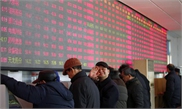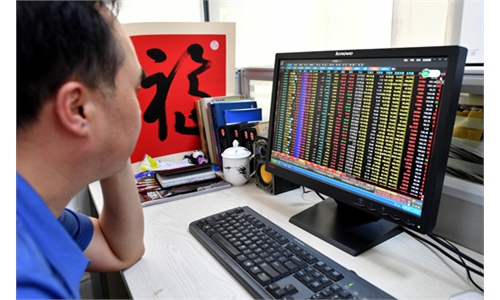COMMENTS / COLUMNISTS
Making Shanghai, HK and Shenzhen star financial centers in the 21st century

Illustration: Chen Xia/GT
Bolstered by the excessive liquidity in the market to support pandemic-stricken economies and enterprises, major stock markets, from New York and Tokyo to Hong Kong and Shanghai, have boomed in recent months. This once again proves that liquidity is king for the capital market.The CSI300 index, tracking the 300 biggest traded companies in China's two bourses in Shanghai and Shenzhen, surpassed its 2015 peak in January 2021, after jumping an impressive 28 percent last year. A growing number of investors, from within China and abroad, are pinning high hopes on a continuous significant rally in China's equities market in the months ahead.
Last year, the world witnessed a record high number of Chinese corporate IPOs, together with a hefty jump in share prices. Compared with the end of 2019, the added value of Chinese mainland stocks in 2020, including those listed at Hong Kong and New York exchanges, totaled at approximately $5 trillion.
Now, major brokerages, including CITIC Securities and China International Capital Corp (CICC), have made the bullish calls for this year. The prospects for Chinese shares look bright and they are likely to continue rising until the end of 2021 on the back of a vigorous economic recovery fired up by domestic expenditure and exports, according to forecasts by the brokerages. Chinese market opportunities encompass rapidly growing domestic consumption companies and a group of high-tech startups producing semiconductor microchips and environmentally friendly electric vehicles.
Chinese investors, after witnessing a decade of eye-popping housing price hikes which have enriched many in the country, are facing another golden opportunity to build up their wealth through stock market investments. Nourished by global central banks' loose monetary policies, properties and stocks will be trending high.
The decision-makers in Beijing also seem intent on building up and strengthening the country's capital market and making use of global funds to shore up a Chinese fleet of world-renowned brands. The launch of the Shanghai technology-studded STAR market and the phase-in of a broader registration-based IPO system have epitomized Beijing's aspirations. Last year, Chinese companies sold $280 billion of stock, up 72% compared with 2019.
A prosperous stock market tends to make more Chinese - the country's 450 million-strong middle class in particular, more affluent. When average Chinese households can obtain higher capital gains through stock investments, they will shop more, which will boost domestic consumption and accelerate the economy. Last year, 177.8 million new stock market investors were registered, and in December alone, the mainland stock market recorded 1.62 million new investors.
Additionally, China's market is being increasingly propped up by big money flowing in from overseas.
According to data provided by SWIFT, the global US-dollar centric payment system, the Chinese yuan's usage monitored under the system in January 2021 made up 2.42 percent of gross global currency exchanges, climbing from 1.88 percent recorded for December 2020, which shows that more foreign currencies are being converted to the yuan for equities investments.
The Chinese government has undertaken a spate of structural reforms to give foreign investors greater access to Chinese equities. The removal of the investment quotas previously placed on foreign institutional investors in 2019 - one of the boldest reform measures implemented by China's government since 2010 - has helped to open up the global investment landscape, letting big overseas investors capitalize on China's economic growth.
The strong economic fundamentals of China will provide a solid launching pad for elevating stock indexes in 2021, pundits say.
China has largely contained the coronavirus pandemic, and a large-scale vaccination drive is soon to be rolled out nationwide. After achieving 6.5 percent real GDP growth in the fourth quarter of 2020, the IMF forecasts that the Chinese economy will accelerate by 8.2 percent this year, which, if realized, will catapult China's economy to the size of $17 trillion.
Accompanying the strong economy, major Chinese companies and tech startups - representing the fastest growth of the country's "new infrastructure, new energy and new (internet-based) retail" crusade - are expected to gain substantially in stock values. Business profits of these industrial lines will pick up once Chinese people rack up spending and foreign demand for Chinese goods rises too. Many Chinese companies merit attention from global investors. New industrial sectors such as clean energies, AI and robotics, online education and e-commerce are poised to gain greater market share.
Impressed by the China's performance in curbing the COVID-19 crisis and attracted by its rosy economic prospects, torrents of overseas capital including private equity funds, hedge funds and insurance funds, are swarming to invest in Chinese shares via the Hong Kong-mainland "stock connect" scheme.
Data shows overseas investments in Chinese stocks have now amounted to more than 2 trillion yuan. The trend is predicted to continue, with a recent HSBC survey of big global investors finding 71% of those who invest in stocks plan to increase their Chinese mainland portfolio.
Hong Kong, recognized globally as a premium financial hub, will continue to remain an indispensable gateway for onshore and offshore funds seeking a springboard into the mainland. Currently, Chinese mainland companies have accounted for 52 percent of the 2,500-odd listed companies in the city, including star companies such as Tencent, Alibaba, Xiaomi, Meituan and JD.com. Didi Chuxing plans to list in the city this year.
If the US government continues to pressure Chinese companies to delist from the US market - as was the case with China Mobile, China Unicom and China Telecom, which were all ordered to stop trading at the US market - more Chinese traded companies will move back home, and the rising number of quality IPOs on this market will fortify Hong Kong, Shanghai and Shenzhen as the 21-century global financial centers.
The author is an editor with the Global Times. bizopinion@globaltimes.com.cn



